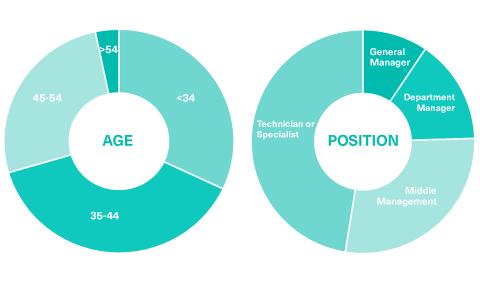
Master in Global Data Management
- ONLINE
- 60 ECTS
- 7500€
- OPEN CALL
- 12 MONTHS
- SPANISH
The Master in Global Data Management, with a Master's degree in lifelong learning, provides professionals and managers with the definition of strategies and knowledge of tools that allow them to work in an organisation with a large amount of information, improving their innovative capacity and the adjustment of their decisions to the present and future needs of their clients.
All students who successfully complete the Master's Degree may optionally take the exam to obtain the aCAP® (Associate Certified Analytics Professional) or CAP® (Certified Analytics Professional) certifications, key accreditations for the area of operations and analytics.

Master in Global Data Management (Spanish)

Universitat de Barcelona
Get a double degree from our academic partner, the reference university in Catalonia and Spain with more than 560 years of history behind it.

QS Stars Rating System
We are the first 100% online Business School in the world to receive the QS Stars rating, obtaining the highest distinction, five QS Stars, in the Online Learning category.

Eduniversal Ranking
The Master in Global Data Management is ranked 5th in Spanish in the Big Data Management category of the Eduniversal 2024 Ranking.
Master's Degree in Global Data Management Syllabus
Our programme is structured in 4 blocks and culminates with the Master's Thesis. In addition, during the programme there will be two voluntary bootcamps and different additional activities.
Block 1. Initiation
Block 2. Deepening
Block 3. Management
Master's Final Project
Bootcamps and additional activities
1. Initiation
Data governance is experiencing extensive growth as a management area within organisations. Data governance is the central and cross-cutting area of all data governance knowledge areas. It includes the management of data ownership, data value and data quality in order to generate value for the organisation. Data Quality is also a key factor for the success of any data-related initiative within an organisational environment. This subject opens the door to the world of data processing in the organisation, offering the ideal approach: to obtain a 360-degree vision of the entire field of data governance in order to subsequently be able to enter into the respective details of each area of knowledge.
Professor: Marc Barà Iniesta, Founder of ProjectWorkLab.
VIEW LINKEDIN
Data architecture is one of the main topics to understand in Data Management, mainly because it represents the backbone of data strategy and understanding of an organisation's data resources and products.
In this course we will provide an overview of modern data architecture, addressing the fundamental components of modern data solutions. Focusing on concepts such as Data Mesh and Data Fabric, as well as key elements of data architecture such as storage, ingestion methods, processing options and service techniques.
We will also explore cross-cutting components such as orchestration, observability and cost optimisation in cloud service providers. Also addressing options and opportunities now offered by Generative AI.
Professor: Francisco Luis Fernández Pinilla, Head of Digital Platform & Enterprise Architecture at Sopra Steria.
VIEW LINKEDIN
2. Delving deeper into Data Management
Data Analytics is the trend-setting science in the organisational environment, which in the business context includes the collection, storage and analysis of data to improve decisions and corresponding results. In this module the student will gain the skills and knowledge necessary to use data to make strategic and operational decisions and design solutions to address different business situations.
Professor: Matthew Charles Alexander, Senior Manager Deals at PwC Spain.
VIEW LINKEDIN
This subject focuses on offering the student an integral vision of Data Science as a process that generates great value for the business and which is currently being adopted by the majority of companies. It will cover the main algorithms and predictive models used such as decision trees, logistic regression, and association rules, where the student will learn the corresponding functions, characteristics, good practices, etc. With a theoretical/practical approach, students will understand the role of the Data Scientist, one of the most requested information-related disciplines in the organisational world today.
Professor: Alfonso Fernández Ramos, Data Manager en Devoteam.
VIEW LINKEDIN
In this module you will review some of the main modern technologies and architectures focused on Big Data. You will not take a technological approach, but will share the knowledge that will allow any manager to manage with ease within the wide range of information management products and services that may be needed.
Professor: Efrain Ruh Sosa, Field CTO Continental Europe at Digitate.
VIEW LINKEDIN
Most of the strategic initiatives related to data are carried out through projects, and in this sense, this subject is of great relevance for all professionals involved in the world of data. In this course the student will be able to identify and learn about the best practices in Project Management, especially related to data, visualising traditional, agile and hybrid methods. This module will also allow students to lay the conceptual foundations for the final project of the master's degree (TFM).
Professor: Sajid Abad Gracia, Project Manager Officer at Logicalis Spain.
VIEW LINKEDIN
Data Security is a really important area within Data Management, data has become one of the most important assets for organisations, the emergence of the most recent technologies related mainly to Social Networks, E-Commerce, Cloud Computing, Big Data, among others, have made companies worry strategically about protecting it and thus guarantee its operation and permanence in the market. Throughout this module you will see topics such as the strategic vision of data security in the company, industrial espionage and the elements of information security, among others.
Professor: Ángel Escudero Molina, Security & GRC Advisor at GOVERTIS Advisory Services S.L.
VIEW LINKEDIN
Modern BPM systems are complex enterprise architectures involving different technologies, workflows, case management, business rules management systems, event management systems, analytical models, among others. The processes in companies are increasingly complex and cover a wider spectrum, customers, employees, suppliers, this means that BPM systems have to communicate with external systems in order to integrate processes and data. In this course you will learn about topics such as the BPM lifecycle, business process optimisation and BPM evaluation, among others.
Professor: José Luís Pallarés Espejo, Director of Cloud Transformation at CaixaBank Tech.
VIEW LINKEDIN
3. Management
This module aims to introduce students to the legal and ethical implications surrounding the use of data and information processing technologies. These issues are closely related, as organisations should "intellectually" motivate their actions in terms of ethics and materially act in terms of legality.
Professor: Ramón Miralles López, Socio de Privacidad, Ciberseguridad y Corporate Compliance en ECIJA Barcelona.
VIEW LINKEDIN
The Data Culture goes far beyond a company strategy, it is a methodology that leads the professionals of an organisation to see the value of the information built from data and the training of human capital. The aim of this course is to raise awareness of the value of the data culture in the organisation among professionals and managers. A complete overview of the concept, creation, implications and improvements of data culture will be given.
Professor: Gema Caballero Muñoz, Big Data & Business Intelligence Project Leader at ENGIE.
VIEW LINKEDIN
Master's Final Project and Additional Activities
This programme is designed to complement the content of the thematic blocks with the necessary training to achieve their internalisation. The training is conceived from a threefold perspective: technical assistance, personal support and individual and group challenges that are necessary to achieve the objectives set.
Training complements
Prior to the start of the programme, students will have access to two classrooms where they will find training resources that will enable them to acquire the knowledge and develop the skills necessary to follow the course correctly. These courses will be monitored by a teacher until the actual start of the programme. These complements are:
- Introduction to programming: Python
- IT Infrastructures
Pre-Masters Bootcamps
The student will have the opportunity to take 3 Pre-Master Bootcamps that will be opened progressively and can be taken at any time. Once the course has been completed and passed, a certificate of completion will be awarded.
- Bootcamp 1. Personal Branding
- Bootcamp 2. Data Storytelling
- Bootcamp 3. Creative thinking and innovation
In addition, students will also have the opportunity to take these pre-master courses; however, these are available in English only:
- Building Your Professional Brand for Employability and Career Success
- Finance Fundamentals
Introductory workshop | Campus Training
Before the start of the academic year, students will have the opportunity to attend an introductory workshop on the Campus where they will be provided with the tools and knowledge necessary for the correct use of the platform during the academic year.
Professional Development Programme (PDP)
Two weeks before the start of the academic year, students will be able to participate in a professional development programme where they will work hand in hand with a teacher to develop different skills such as time management, productivity and stress management and emotional intelligence. Upon completion of the workshop, and provided that the relevant activities have been carried out, a certificate of completion can be obtained.
The final project is a fundamental element in the development of the Master in Data Management and Technological Innovation. In its preparation, you must consider all aspects related to the development and management of a project related to information technologies, defining the strategic position of the company in the area and designing the implementation of those measures and business policies that are considered most appropriate to achieve the objectives related to the area of Data Management, both in the short and medium and long term. Fundamentally, it consists of developing an innovative proposal around a technological solution based on Data Management within a real business environment or entrepreneurship. This proposal must be framed within the topics and knowledge acquired throughout the Master's degree.
The Master's in Global Data Management is complemented by lectures and seminars given in each of the blocks. These additional activities are carried out by renowned professionals in business management who, through videoconferences, present their experiences and case studies.
Bootcamp: preparation for CAP/aCAP certifications
During two weeks, you will develop a seminar where you will be provided with all the information regarding the CAP (for students with more than 3 years of professional experience in analytics) / aCAP (for students with less than 3 years of professional experience in nalytics) certifications, as well as additional materials to prepare for it. The bootcamp will be divided into three blocks: 1. Introduction to the key concepts; 2. Note: The cost of the certification is NOT included in the price of the programme; however, OBS students receive a discount on the exam fees.
Professor: Raquel Jorge Hernando, Senior BI Engineer en Elastacloud.
VIEW LINKEDIN
Bootcamp: AWS Cloud Computing Certification Preparation
Ideal for all profiles, this 4-week course provides an understanding of the fundamental concepts of the AWS Cloud to help you gain confidence to contribute to your organisation's cloud initiatives. This course is also the starting point for preparation to earn your AWS Certified Cloud Practitioner certification when it's most convenient for you.
After completing the course, you will understand the benefits of the AWS Cloud and the basics of its global infrastructure. You will be able to describe and provide an example of core AWS services, including compute, networking, databases, storage, and analytics. For the financially driven, you will articulate the financial benefits of the AWS cloud, define core billing and pricing models, and learn how to use pricing tools to make profitable decisions for AWS services. Note: The cost of the certification is NOT included in the price of the programme; however, OBS students receive a discount on the exam fees.
Professor: Juan Manuel Gómez, Senior Enterprise Account Manager at Amazon Web Services (AWS).
VIEW LINKEDIN
Bootcamp: Technology Management
This bootcamp aims to bring students closer to the ethical and legal implications that revolve around the use of information, given that nowadays the collection and analysis of information, with the aim of expanding knowledge and developing intelligence applicable to the activity of public and private organisations, is no longer just a challenge, it has become a necessity.
Professor: Gonzalo Cuatrecasas Freixas, Cyber Security Manager en Axel Johnson International AB.
VIEW LINKEDIN
Company visits
During the programme, students will have the opportunity to attend synchronous videoconferences with professional experts in the programme area. They will share their experience and provide best practices in the sector.
Webinars
Most of the training is done asynchronously, that is, the exchange of knowledge is done through a platform that allows sharing written texts without the need for people to be connected at the same time. Additionally, in each of the modules, synchronous sessions or 'webinars' are organised, where all participants are connected at the same time through an application, which allows the exchange of knowledge in 'real time'.
Students taking the Master in Global Data Management will be able to prepare for the following certifications*:
- Informs CAP/ aCAP certifications
- AWS Cloud Computing Skills
*The cost of the certifications and the preparatory course is not included in the price of the programme.
In addition, students will also have the opportunity to prepare for the following certifications**:
- ICN Business IT Certification
- Scrum Certification (Product Owner & Scrum Master)
**The cost of the certifications and the preparatory course is not included in the programme fee.
Methodology

OBS has an online methodology where the core is the student. Always backed by active and internationally renowned lecturers, who share their knowledge to enhance the professional development of students through a flexible, collaborative method with personalised monitoring. The aim is to create a unique educational experience that allows the assimilation of knowledge in a practical way.
Student ON's fundamental pillar is the student and, for this reason, throughout the course students have their Programme Manager, an academic figure who accompanies them in a personalised way.
Diploma
After successfully finishing the Master's degree, and having completed the relevant procedures, you will receive the Master's degree from OBS Business School. In addition, and provided that you meet the established academic and administrative requirements, you will obtain a Lifelong learning Master's degree from the Universitat de Barcelona (UB).
In order to obtain it, you must have a university degree. In the exceptional case of not having this degree and having passed the Master's evaluations, you will obtain a Higher University Diploma from the Universitat de Barcelona (UB).
At OBS Business School we are committed to having our own degree, which allows us to quickly update and adapt the programmes in each edition to be at the forefront of the educational level demanded by companies today. Our programmes are designed for professionals who want to strenghten their management skills and learn through an international experience.

Admission Process
The fundamental aim of our admissions process is to ensure the suitability of candidates. All participants should get the most out of this learning experience, through a context in which it is possible to develop long-term relationships with classmates, faculty and alumni.
After completing the application form for one of our programmes, you will receive an e-mail with information about the School and a member of the Admissions Department will contact you to start the admission process.
Once you have successfully passed the personal interview, you must submit all the required documentation to continue the admission process and certify that you meet the requirements of the student profile. After the Admissions Committee, if it is positive, you will be able to register and enrol in the programme you have applied for.

Student Profile
Get to know the profile of the students who have studied the Master in Global Data Management.

Master in Global Data Management Career Opportunities
Thanks to the Master's Degree in Global Data Management at OBS Business School, you will be able to develop in the following positions:
- Chief Data Officer (CDO)
- Data Architect
- Data Consultant
- Data Scientist
- Data Engineer
- Asset Manager
- Business Analyst
- Big Data Infrastructures Manager
- Big Data Systems Auditor
- Investment Professional


